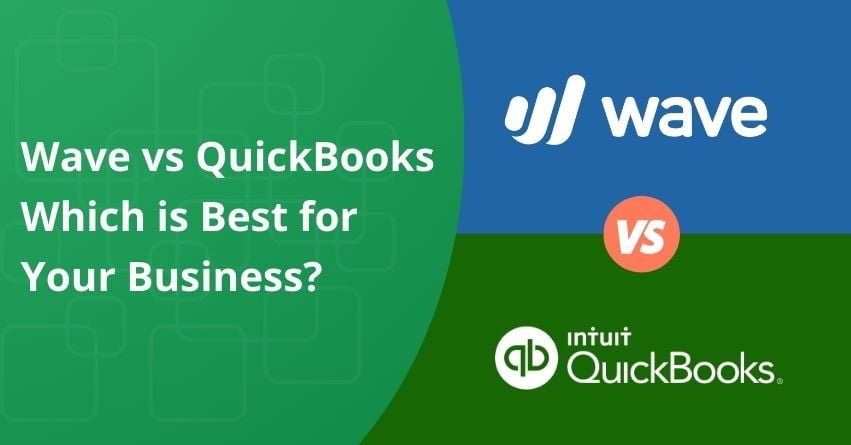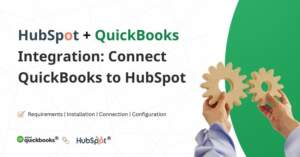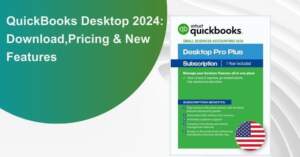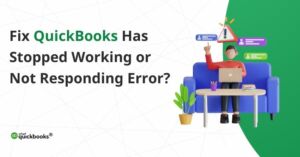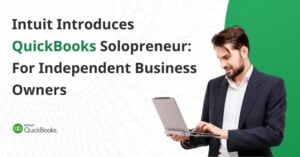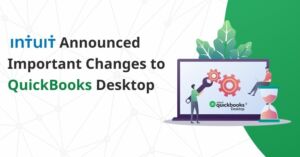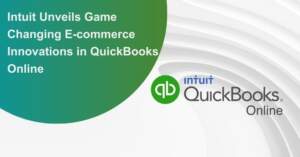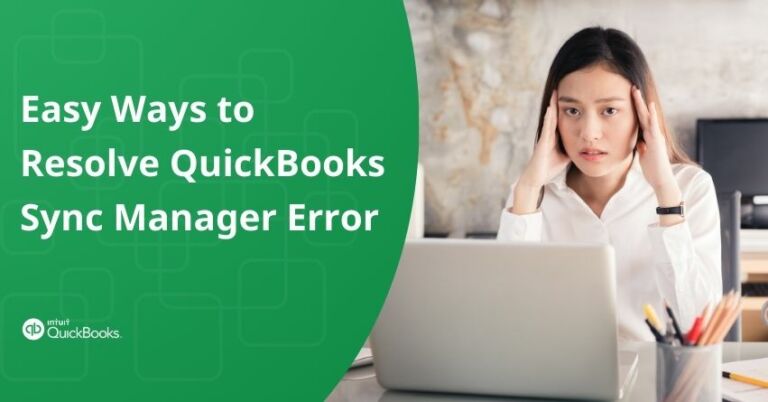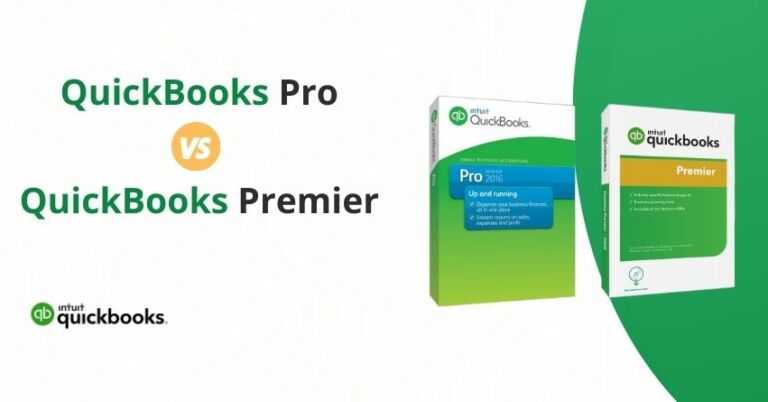Table of Contents
ToggleWave and QuickBooks are accounting software solutions designed for small businesses, freelancers, and entrepreneurs. Both software offers a range of features to manage your day-to-day finances, including invoicing, expense tracking, financial reporting, tax preparation, and much more. QuickBooks and Wave are accessible from anywhere with an internet connection due to their cloud-based capability. While they share similarities in their target audience and core functionality, there are also differences in terms of pricing, user interface, and additional features offered.
In this article, we’ll delve into a detailed comparison of both software solutions, exploring their features comprehensively. By examining their respective strengths and weaknesses, we aim to assist you in determining which one aligns better with your specific accounting requirements.
Wave vs QuickBooks: At a Glance
| Wave | QuickBooks | |
| Starting Price | Free | $15/month, then $30/month (QuickBooks Online) |
| Invoicing | You can make personalized invoices with your logo and style, save client and service info, and set up invoices to repeat automatically. | QuickBooks lets you customize invoices with branding, save client details, and set up recurring billing. |
| Time Tracking | – | Track billable hours to add to invoices |
| Expense Tracking | Expense tracking is automated | Expense tracking, receipt capture, and mileage tracking are automated. |
| Payments | Invoices can be paid through ACH, credit/debit card or Apple Pay | Invoices can be paid through ACH, credit/debit card or Apple Pay |
| Payroll | Add-on costs $35 plus $6 per employee/contractor monthly. | Introductory price: $22.50 + $5 per employee/contractor/month, then $45 + $5 per employee/contractor/month. |
| Banking | You can choose to open a linked checking account for no charge. | Opening an integrated checking account is optional and free of charge. |
| Integration | Third-party integration options are fewer. | Has a wide range of integration options. |
| Mobile Accounting App | Yes, limited features | Yes, fully featured |
| Number of Users | Differs according to the plan | Differs according to the plan |
| Ease of Use | Easy | Moderate |
| Customer Support Options Available | Starter users have self-help resources and can get email and live chat support with an add-on. Pro users get both support options included. | QuickBooks offers live chat, chatbot, and call-back phone support, along with access to a large network of QuickBooks ProAdvisors. |
Detailed Comparison of Wave vs QuickBooks
Here is a detailed comparison between QuickBooks and Wave. Read through the end to find out which one best suits your business needs and make an informed decision.
1. Invoicing
Wave: Wave offers a user-friendly invoicing tool that allows businesses to create and customize professional invoices quickly. Users can add their logo, customize invoice templates, and set up recurring invoices for regular clients. Additionally, Wave enables businesses to track invoice status, send reminders for overdue payments, and accept online payments through credit cards and bank transfers. Wave invoicing is slightly inclined towards freelancers and solopreneurs.
QuickBooks: QuickBooks provides comprehensive invoicing capabilities, allowing users to create customized invoices, track invoice status, and send automatic payment reminders to clients. It also supports recurring invoices and offers options for online payment processing, making it convenient for businesses to get paid faster. Moreover, QuickBooks integrates seamlessly with other QuickBooks features like accounting and payroll.
2. Time Tracking
Wave: Unlike QuickBooks, Wave does not offer native time-tracking functionality within its platform. However, users can integrate third-party time-tracking apps or manually input time-tracking data into Wave for billing purposes.
QuickBooks: QuickBooks offers built-in time tracking features that enable businesses to track billable hours by project or client. Users can enter time manually or use a timer, and the recorded hours can be directly linked to client invoices for accurate billing. QuickBooks’ time tracking functionality helps in the invoicing process and helps businesses ensure they’re billing clients accurately for the time spent on projects.
3. Expense Tracking
Wave: Wave simplifies expense tracking with features for uploading receipts, categorizing expenses, and generating detailed expense reports. Users can link expenses to specific transactions, projects, or clients, making it easier to track expenses for tax purposes or client billing.
QuickBooks: QuickBooks offers robust expense tracking capabilities, allowing users to capture expenses by linking bank accounts, credit cards, and receipts. QuickBooks automatically categorizes expenses and provides real-time insights into business spending. Additionally, it offers an advanced accounting package with bill management, inventory, and job costing capabilities.
4. Payments
Wave: Wave Payments enables businesses to accept online payments directly from invoices, eliminating the need for third-party payment processors. Wave Payments supports credit card payments and bank transfers, with competitive transaction fees and fast funding times. However, Wave Payments is currently available only in select countries.
QuickBooks: QuickBooks Payments offers seamless integration with QuickBooks’ invoicing and accounting features, allowing businesses to accept online payments from clients. QuickBooks Payments supports credit card payments, bank transfers, and ACH payments, providing businesses with multiple payment options to accommodate their clients’ preferences. Moreover, QuickBooks Payments facilitates automatic reconciliation of payments, saving time and reducing errors in financial reporting.
5. Payroll
Wave: Wave offers payroll services as an add-on feature, allowing businesses to manage payroll, including calculating taxes, issuing paychecks, and filing payroll taxes. Wave’s payroll services are available in select countries and are suitable for small businesses with specific payroll needs.
QuickBooks: QuickBooks Payroll provides comprehensive payroll solutions for businesses of all sizes, offering features such as automatic payroll processing, tax calculations, direct deposit, and tax filing services. QuickBooks Payroll integrates seamlessly with QuickBooks’ accounting software, ensuring that payroll data is accurately reflected in financial reports. Additionally, QuickBooks Payroll offers advanced features like time tracking integration and employee benefits management.
6. Banking
Wave: Wave offers basic banking features, allowing users to connect bank accounts and credit cards to import transactions into Wave’s accounting software. While Wave simplifies bank reconciliation with automatic transaction categorization, it lacks advanced banking functionalities like bank feeds and transaction rules.
QuickBooks: QuickBooks provides robust banking capabilities, including bank feeds, transaction matching, and bank reconciliation. Users can connect multiple bank accounts and credit cards to QuickBooks, enabling real-time synchronization of financial data. QuickBooks’ banking features help businesses maintain accurate financial records and monitor cash flow effectively.
7. Integrations
Wave: Wave offers limited integrations compared to QuickBooks, with fewer third-party apps and software solutions available for seamless integration. While Wave supports integrations with popular tools like PayPal, Shopify, and Etsy, its ecosystem of integrations is relatively smaller.
QuickBooks: QuickBooks boasts a vast ecosystem of integrations, with support for hundreds of third-party apps and software solutions across various categories such as e-commerce, CRM, project management, and time tracking. QuickBooks’ extensive integrations make it adaptable to different business needs and workflows, allowing users to customize their accounting software stack to suit their preferences.
8. Pricing
Wave: One of Wave’s most significant advantages is its affordability, as it offers a free accounting software solution with core features like invoicing, expense tracking, and basic accounting. Wave generates revenue through optional paid services such as payroll and payment processing, with transparent pricing and no hidden fees.
QuickBooks: QuickBooks offers several pricing plans tailored to different business needs, including Self-Employed, Simple Start, Essentials, and Plus. Pricing varies depending on the plan and additional features such as payroll and payment processing. While QuickBooks’ pricing may be higher than Wave’s, it offers a broader range of features and scalability for growing businesses.
Why is Wave the Best Fit for You?
If you’re a small business owner or freelancer looking for a free accounting software solution with essential features like invoicing, expense tracking, and basic accounting, Wave is an excellent choice.
Wave’s intuitive interface and pricing make it accessible to users with limited accounting knowledge or experience.
Wave’s emphasis on affordability and transparency appeals to budget-conscious businesses seeking cost-effective accounting solutions.
Why is QuickBooks the Best Fit for You?
If you’re a medium-sized business with more complex accounting needs, QuickBooks offers a wide variety of features, including invoicing, expense tracking, payroll, and advanced reporting.
QuickBooks’ extensive integrations and scalability make it suitable for businesses looking to customize their accounting software stack and workflows. QuickBooks’ robust banking capabilities and support for automation features help businesses save time and improve efficiency in financial management tasks.
Conclusion
Both Wave and QuickBooks are reputable accounting software solutions that cater to the needs of small businesses, freelancers, and entrepreneurs. While both platforms offer similar core functionalities such as invoicing, expense tracking, and financial reporting, they differ in terms of pricing, additional features, and integrations.
The best choice between Wave and QuickBooks depends on your specific business requirements, budget, and preferences. Whether you prioritize affordability, simplicity, or advanced functionality, both Wave and QuickBooks have something to offer to help you run your business successfully.
If you need any help, reach out to our team at the toll-free number +1-855-875-1223.
Frequently Asked Questions
Wave is like a basic tool made for freelancers and small businesses. It’s easy to use but doesn’t handle complex needs well. QuickBooks, however, is able to handle any business size or complexity, growing with your needs.
1. Zoho Books is ideal if you’re already using other Zoho products.
2. FreshBooks suit freelancers perfectly.
3. Xero is great for businesses that are already established.
4. QuickBooks Online is best suited for larger accounting departments.
5. Quicken is your go-to for managing expenses effectively.
6. NetSuite excels in automating accounting tasks.
7. Sage Business Cloud Accounting is perfect for straightforward accounting needs.
Wave doesn’t integrate with QuickBooks. However, there are some third-party apps with which you can make this integration happen.
With Wave Invoicing, there’s no monthly fee, which is great! But when you get paid through the service, they take a small cut: 1% for bank payments and 2.9% + 60 cents for credit card payments (or 3.4% + 60 cents for American Express).
Yes, you can migrate from Wave to QuickBooks with the help of Specialist migration partners. Here are the things you can import: customer lists, vendor lists, charts of accounts lists, products, services, and much more. You can also import invoices, credit notes, sales receipts, and bills.

